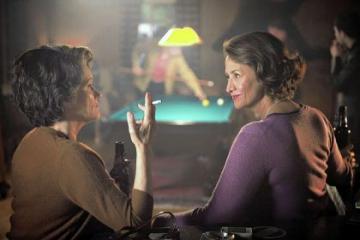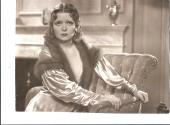'Hannah Arendt': Holocaust, Eichmann and the controversial `banality of evil'
How do you make a film about a great thinker? Thinking is not the most kinetic or photogenic activity. Hannah Arendt does a lot of it in the film that bears her name.
She was one of the greatest political theorist-philosophers of the 20th century, dispensing wisdom before, during and after publication of her landmark study, "The Origins of Totalitarianism" (1951). A German Jewish refugee from Naziism, Arendt and her husband, Heinrich Blucher, had long been living in comfortable academic exile in New York at the time of the stunning incident that opens the movie:
Adolf Eichmann -- the man in charge of implementing the Nazis' pan-European transportation system for Jews murdered in the Holocaust -- had escaped detention at the end of the war and, with the aid of a Vatican-obtained passport, made his way to Argentina. He is now, in 1960, located and kidnapped outside Buenos Aires by the Mossad and whisked off to Israel to face justice.
Arendt (Barbara Sukowa), fascinated as well as repulsed, convinces The New Yorker to let her cover the war crimes trial. She needs to see him at close range. But the result would be much more than courtroom coverage; it will be a groundbreaking insight into the nature of evil.
"Blood is a very special juice," snarls Mephisto in Goethe's "Faust." But Eichmann is no Mephistopheles. The master of genocidal logistics wasn't what she thought he'd be.
"Evil is supposed to be something demonic," Arendt would conclude in the five-part series later turned into a book. "Its incarnation is Satan. But in the case of Eichmann, I could find no such trace of Satanic 'greatness.' " Eichmann was not a monster, nor even particularly anti-Semitic. "He was simply unable to think. Sheer thoughtlessness -- not to be confused with stupidity -- predisposed him to become one of the greatest criminals of the 20th century."
A nobody, a high school dropout, a cog in the wheel, a mindless bureaucrat, Eichmann was "only following orders." He feels no guilt. He is proud of his obedience (not to mention his efficiency). He just obeyed the law. If, instead of "Thou shalt not kill," the law said, "Thou shalt kill," -- it wasn't his fault. "I never exterminated anyone!" he says -- not personally. And he believes it.
Arendt's resulting theory of "the banality of evil" held that the worst evils come from not thinking for oneself: "the huge difference between the unspeakable horror of the deeds and the mediocrity of the man."
That infuriated many as a "defense" of Eichmann. Even more controversial was her view that Jewish leaders themselves contributed to the magnitude of the Holocaust by their cooperation with the authorities through the Judenrate, or "Jewish Councils," acting as liaisons between the Nazis and the caged-in ghettos, to run basic services, provide Jewish slave labor ("Arbeit macht frei"), and round up Jews for "resettlement in the East" -- the euphemism for deportation to death camps. "We were put in camps by our friends as well as our enemies," Arendt would say. The negative fallout threatened her career and her lifelong friendships alike.
Director Margarethe von Trotta has previously produced biopics of such powerful women subjects as the mystic nun Hildegard von Bingen (2010) and leftist revolutionary Rosa Luxemburg (1986). Her no-frills screenplay at hand is similarly uncompromising in its intellectual and historical demands on the audience, compounded by the complexities of German high-philosophical thought.
The extent to which it succeeds is due to the superb performance of Ms. Sukowa, who is Germany's Meryl Streep (and who played both Hildegard and Rosa). She renders Arendt as fiercely argumentative, stubborn, loyal, arrogant. When New Yorker editor William Shawn (Nicholas Woodeson) calls to inquire politely about her progress, she replies, "I'm working hard, and it would be nice if I could continue working instead of chatting on the phone."
Arendt (1906-75) was rational to the point of coldhearted, a fascinating woman to be sure -- which doesn't necessarily make for a fascinating film. Aside from her thinking and her chain-smoking (ah, the good old days -- smoking was not only accepted but virtually required), there's little to look at here, except for the morbidly riveting black-and-white documentary footage of Eichmann himself, blinking in his glass cage. Flashbacks of Arendt's affair with her great philosopher-teacher Martin Heidegger (Klaus Pohl), who copped out by joining the Nazi Party, are skimpy and perfunctory. No sex scenes for these thinkers (just as well -- they would've been too phenomenological).
Axel Milberg is good as Hannah's almost too-good-to-be-true husband Heinrich, and Janet McTeer lends some needed humor as her great pal and sidekick Mary McCarthy, author of "The Group" in 1963.
The challenge of dramatizing philosophical ideas is a tough one, especially painful when pertaining to the Holocaust. This theatricalized dialectic is static but honest and engrossing, as devoid of emotional manipulation as Arendt herself. Her analysis continues to have profound ripples: The worst evils are enabled by nobodies, without sensible motives. Where does responsibility begin -- and who must take it -- for the acts of a whole society?
"Thinking is a lonely business," Heidegger says. "I don't want to judge, only to understand," says Arendt -- and to be endowed, by her thinking, with the power to act.
In English and German with subtitles.






